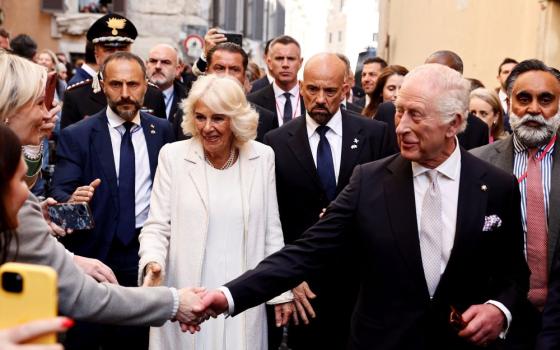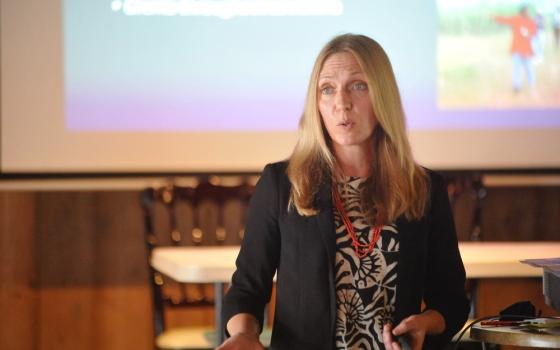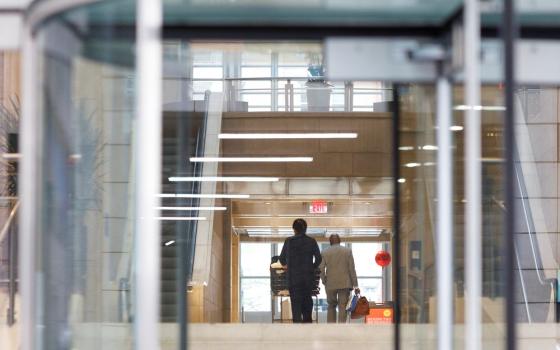Now that you've heard about all the big Catholic stories and happenings of 2011, get ready for a few of the big nonstories and nonhappenings. Some of these say a lot more about the state of the church than do the big events that got wide recognition.
Benedict at Assisi
Pope Benedict did not pray at Assisi. His predecessor John Paul II made an historic breakthrough in 1986 when he invited leaders of many world religions, including Hindus, Buddhists, Jews and non-Catholic Christians, to meet at Assisi, sign a statement calling for world peace and together publicly pray for peace.
2011 marked the 25th anniversary of that event, and Benedict did indeed travel to Assisi along with about 200 other faith leaders. They signed a new peace commitment. But Benedict didn't pray with them.
In response to the tsunami of criticism aimed, mainly by traditionalist Catholics, at John Paul for daring to worship with nonbelievers and heretics, Benedict marked the event this time by first hosting a prayer service for Catholics at St. Peter's on Oct. 26, then taking a train to Assisi on Oct. 27 for the big event. There was friendly discussion, followed by a simple lunch and a period of silence for "individual reflection and prayer," said the Vatican, and a pilgrimage to the basilica of St. Francis for a "solemn renewal of the joint peace commitment." Some of those who gathered may have prayed together, but Benedict refrained.
Child abuse policies
The Vatican did not demand that dioceses still lacking policies to combat child abuse develop them immediately. Instead, the Congregation for the Doctrine of the Faith in May issued a circular letter to bishops conferences worldwide, "suggesting" that it is time to take action. The letter was sent just two days after Amnesty International accused the Vatican of "not complying with its obligation to protect children."
Vatican officials said they chose not to issue hard and fast orders because of its "respect for the fundamental competence of the diocesan bishop" and because the broad principles in the letter "must be adapted to national realities."
Guidelines for faithful citizenship
Catholics are not reading or taking to heart the U.S. bishops' guidelines for faithful citizenship. The results of a poll released at Fordham University in September indicated that just 16 percent of Catholics even knew of the existence of the document, "Forming Consciences for Faithful Citizenship," and just 3 percent had read it.
To heap insult on injury, the poll found that 75 percent of those who did read the document said it had no influence on how they voted, and among those who were unaware of the bishops' advice, 71 percent said it would have made no difference even if they had known about it.
The economy
The U.S. bishops at their fall meeting did not take notice of the nation's economic turmoil. There were no words of sympathy or solace from these shepherds as great numbers of the flock struggle with joblessness, home foreclosures and shrinking savings.
This year marked the 25th anniversary of that landmark pastoral document they produced, "Economic Justice for All," but they took no notice of that either. More pressing matters occupied their attention, including abortion, same-sex marriage and the government's erosion of Catholics' religious liberties. There was also much concern about the secular, relativistic, materialistic and individualistic drifts in modern culture.
No revision of rule on resigned priests
A revision of rules barring resigned priests from having greater roles in local parish life is not going to happen.
Speculation had mounted after a former Vatican official predicted in September that laicized priests would soon be allowed to teach in Catholic schools, serve as Communion ministers and serve on parish councils. But another Vatican official said such accommodations have been discussed, but there are no indications they will be implemented in the foreseeable future.
Vocations of brothers
Religious brothers did not hear an encouraging word. In 1985, the Vatican Congregation for Religious decided it was time for a document analyzing and supporting the vocation of brothers, whose numbers and morale were slipping -- at even faster rates than those of priests and nuns.
The decline has continued, but the letter once again didn't happen in 2011. The secretary of the congregation told NCR's John Allen that a document had gone through several drafts but all were eventually sent back for revision. He could not predict when it might get finished, but indicated the brotherhood remains a vital interest of the church. Some 55,000 brothers worldwide are undoubtedly wondering how vital they are after a 27-year wait.
It's not all bad!
Not all nonevents are bad news. For example, a decision by the Bishop Thomas Olmsted of Phoenix to greatly restrict reception of the precious blood at Mass was not implemented. He changed his mind after discovering that he had erroneously interpreted the new guidelines for communion. In fact, they sought to expand and normalize occasions when Communion under both forms can be offered.
Olmstead's original rationale for limiting was based on his concern that the sacred species might be profaned when untrained, extraordinary ministers are present and that the "role of priest and deacon might be obscured" by an excessive use of extraordinary ministers -- that is, laity.
Readers are welcome to share other nonevents of 2011 -- good or bad.



